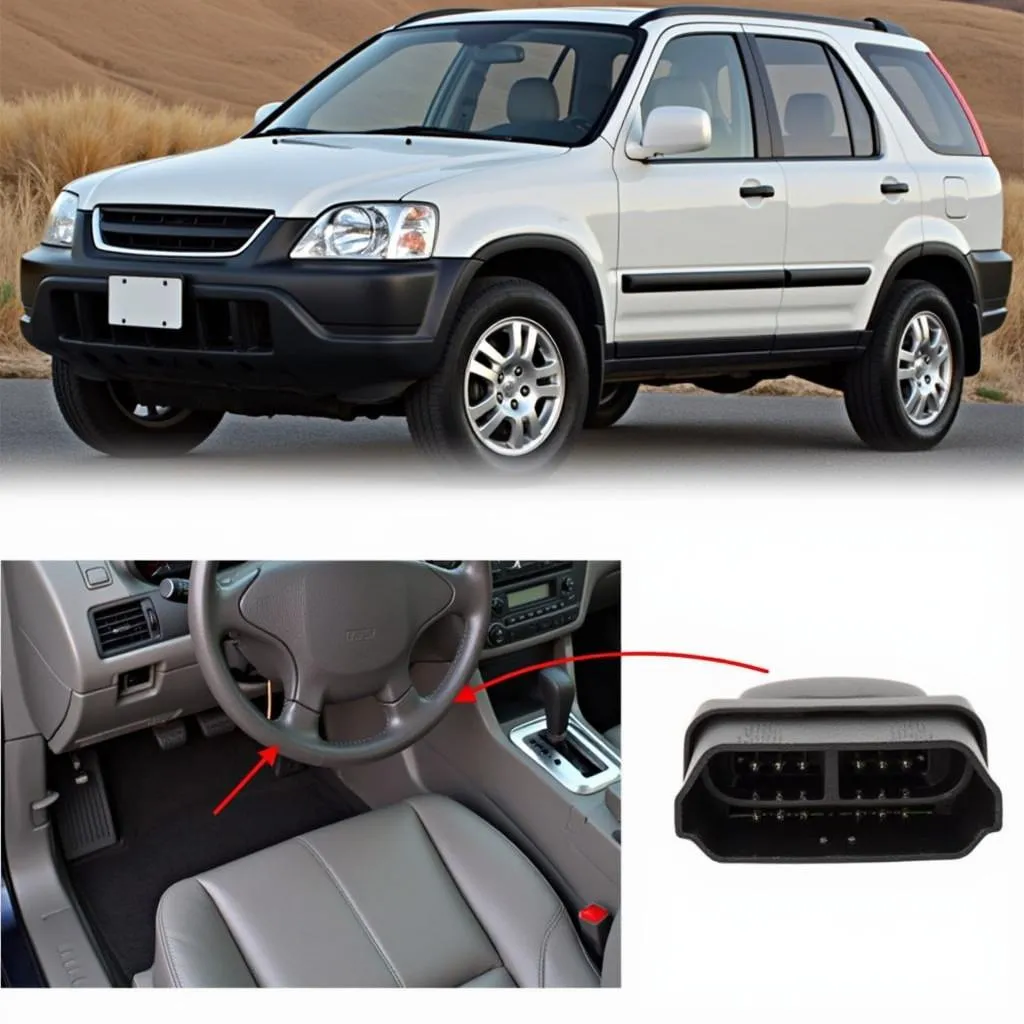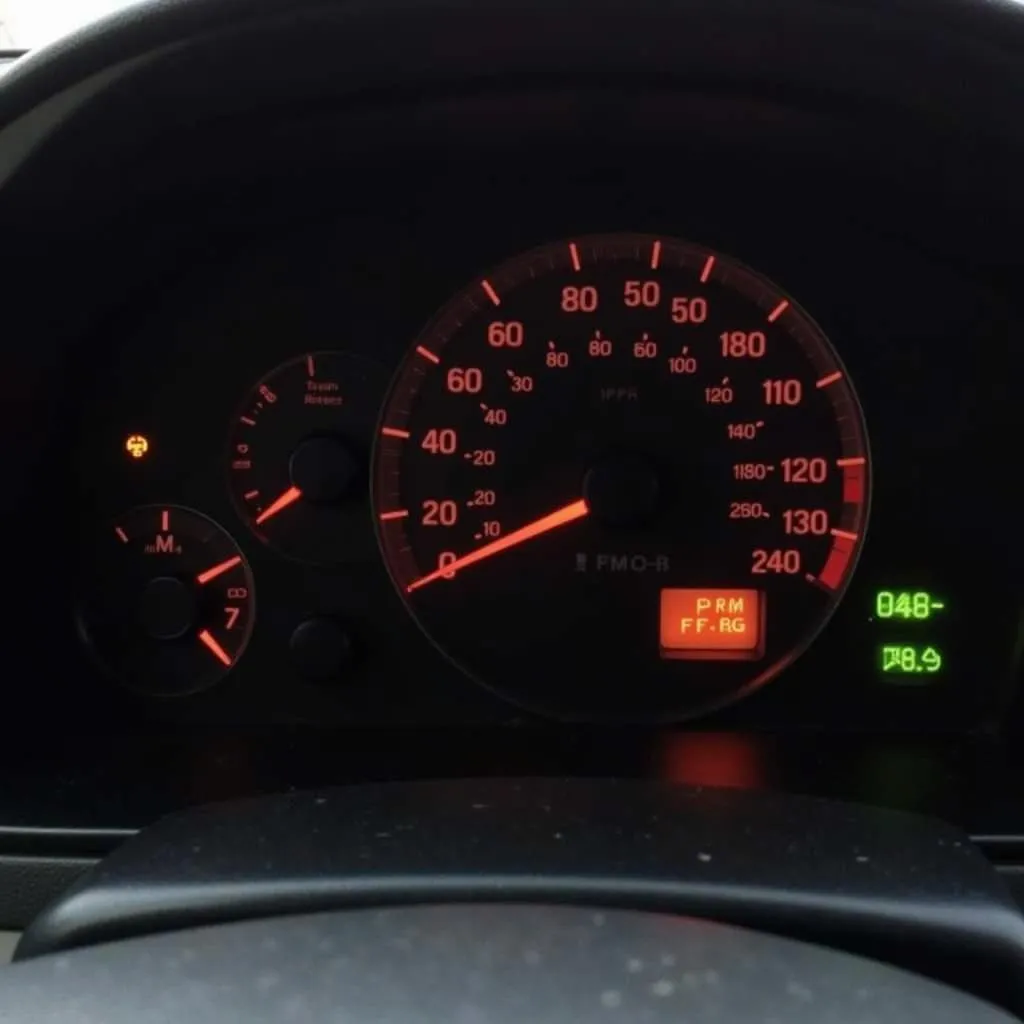Understanding your 2002 Honda CR-V’s OBD codes is key to diagnosing and fixing any issues it may have. This guide is designed to help you decipher those cryptic codes and get your CR-V back on the road.
What are OBD Codes and Why Should I Care?
OBD stands for On-Board Diagnostics. Your CR-V, like all modern cars, has a computer system constantly monitoring its engine and emissions systems. When it detects a problem, it logs a corresponding OBD code, or Diagnostic Trouble Code (DTC), in its memory.
Knowing these codes empowers you to:
- Pinpoint the Problem: Instead of guessing, OBD codes provide a starting point for diagnosing the issue.
- Save Money: You can potentially avoid expensive mechanic visits by identifying simple problems yourself.
- Prevent Further Damage: Addressing issues early on can prevent them from escalating into costly repairs.
How to Read 2002 Honda CR-V OBD Codes
Accessing your CR-V’s OBD codes requires an OBD-II scanner. These handy devices are widely available and affordable. Connect the scanner to the OBD-II port, typically located under the dashboard on the driver’s side. Once connected, the scanner will display the codes stored in your CR-V’s computer.
 OBD-II Port Location in a 2002 Honda CR-V
OBD-II Port Location in a 2002 Honda CR-V
Understanding the Code Structure:
OBD-II codes follow a standardized format:
- The First Character: Indicates the system involved (e.g., “P” for Powertrain, “B” for Body, “C” for Chassis, “U” for Network).
- The Second Character: Identifies whether the code is generic (0) or manufacturer-specific (1).
- The Third Character: Specifies the specific system within the broader category (e.g., Fuel and Air Metering, Ignition System).
- The Last Two Characters: Indicate the specific problem within that system.
Common 2002 Honda CR-V OBD Codes
While numerous codes can appear, some are more common in the 2002 CR-V:
- P0420 (Catalyst System Efficiency Below Threshold): Often indicates a failing catalytic converter, but could also be triggered by a faulty oxygen sensor or exhaust leak.
- P0171 (System Too Lean (Bank 1)): Suggests there’s too much air or not enough fuel in the engine’s air-fuel mixture, potentially caused by a vacuum leak, faulty mass airflow sensor (MAF), or fuel injector issue.
- P0300 (Random/Multiple Cylinder Misfire Detected): Indicates a misfire occurring in one or more cylinders, often due to worn spark plugs, faulty ignition coils, or a vacuum leak.
- P0135 (O2 Sensor Heater Circuit Malfunction (Bank 1, Sensor 1)): Points to a problem with the heating element in the upstream oxygen sensor.
 Mechanic Checking Oxygen Sensor
Mechanic Checking Oxygen Sensor
What to Do When You Get a 2002 Honda CR-V OBD Code
- Don’t Panic: Seeing a code doesn’t necessarily mean a major breakdown is imminent.
- Record the Codes: Write down all displayed codes before clearing them.
- Research the Codes: Use online resources or repair manuals to understand what each code means.
- Address Easy Fixes: If the code points to a simple solution (like a loose gas cap triggering an EVAP code), try that first.
- Seek Professional Help: For complex codes or if you’re uncomfortable diagnosing the issue yourself, consult a qualified mechanic.
Preventative Maintenance for Your 2002 CR-V
- Regular Oil Changes: Follow the manufacturer’s recommended oil change intervals.
- Air Filter Replacement: A clean air filter ensures proper airflow to the engine.
- Spark Plug Inspection: Replace worn spark plugs to prevent misfires.
- Fuel System Cleaning: Periodically clean the fuel injectors and throttle body to maintain optimal fuel delivery.
“My Check Engine Light is Flashing, Is it Serious?”
A flashing Check Engine light usually signals a more serious problem requiring immediate attention. It could indicate a severe engine misfire, which can damage the catalytic converter. It’s crucial to have your CR-V inspected by a mechanic as soon as possible.
Can I Drive My 2002 CR-V with the Check Engine Light On?
While your CR-V might seem to drive normally, ignoring a Check Engine light is never a good idea. The longer you wait, the worse the problem could become, leading to more extensive (and expensive) repairs down the line.
 Check Engine Light Illuminated on Dashboard
Check Engine Light Illuminated on Dashboard
2002 Honda CR-V OBD Codes: Your Key to a Smooth Ride
Understanding and addressing your 2002 Honda CR-V’s OBD codes is vital for keeping it running smoothly. By familiarizing yourself with common codes, investing in a reliable OBD-II scanner, and prioritizing preventative maintenance, you can enjoy many more miles of trouble-free driving. Remember, a little knowledge can go a long way in preventing costly repairs and keeping your CR-V in top shape.
Need help with your 2002 Honda CR-V OBD codes?
We’re here to assist! Contact us via WhatsApp: +1(641)206-8880, Email: [email protected], or visit us at 276 Reock St, City of Orange, NJ 07050, United States. Our dedicated customer support team is available 24/7 to answer your questions and provide expert guidance.
